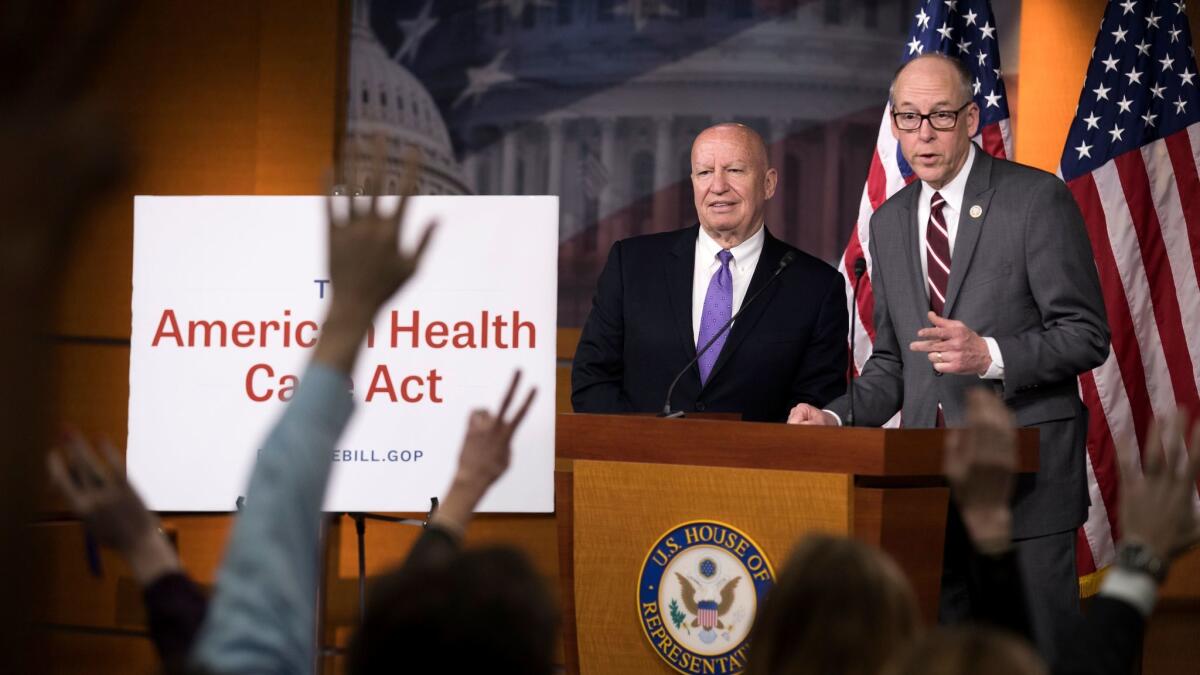Editorial: A healthcare test we’re hoping Republicans will flunk

- Share via
On Thursday, House Republicans and President Trump face their first big test since the election that put the GOP in complete control of the federal government. The House will be voting on a bill to repeal much of the healthcare reform law Democrats pushed through Congress in 2010, replacing it with a skinflint alternative that’s projected to leave 24 million more people uninsured in a decade. It’s a horrible proposal, and the main hope for the country is that dissident Republicans will kill it because it’s not awful enough for them.
The GOP leadership’s “American Health Care Act” abandons one of the core goals of the 2010 Patient Protection and Affordable Care Act (better known as Obamacare) — extending insurance coverage to more people — while doing little or nothing to hold down medical costs or improve care. Instead, it would give a sizable tax break to high-income households and the healthcare industry by cancelling Obamacare’s tax increases; slash federal spending on Medicaid, the healthcare program for the poor and the disabled; and offer new subsidies and insurance rules that are projected to trim premiums for better-off Americans and younger, healthier people not covered by large employer plans.
Republicans are fond of arguing that Obamacare is “collapsing,” a reference to the dwindling number of insurers serving the non-group markets in several states, and the large premium increases in many of those markets last year. Never mind that the vast majority of people served by Obamacare’s insurance exchanges received federal subsidies that shielded them from the brunt of those price hikes. Sadly, many of those families’ subsidies would melt away under the GOP plan, which would provide smaller tax credits tied to age, not income or location. As a result, they would face unaffordable premiums and impossibly high out-of-pocket costs.
To the far-right Republicans in the House Freedom Caucus, that’s simply not bad enough. They apparently don’t want the federal government providing any subsidies whatsoever for these consumers, even though it spends $235 billion annually subsidizing the insurance policies that employers provide their workers. They also want every shred of Obamacare wiped from the books, which Republicans can’t do under the procedures they’re using to avoid a Democratic filibuster in the Senate.
Top Republicans tried to mollify the Freedomites by proposing an even tougher crackdown on Medicaid, making it harder for states to enroll more of their poor residents and easier for them to cover fewer. Because heaven knows the healthcare system in this country works that much better when more Americans go uninsured and have to wait for treatment until their ailments become severe enough for an emergency-room visit.
Yet the Freedomites remain on the fence, as do a number of Republicans who don’t think this bill’s big idea — letting insurers sell cheaper plans that stick their customers with a bigger share of their medical bills — is a good thing for their constituents. They’re absolutely right about that. If the holdouts prevail, it will be a huge loss for Trump and the House GOP leadership. But it will be a welcome win for most of the rest of us.
Follow the Opinion section on Twitter @latimesopinion and Facebook
More to Read
A cure for the common opinion
Get thought-provoking perspectives with our weekly newsletter.
You may occasionally receive promotional content from the Los Angeles Times.









